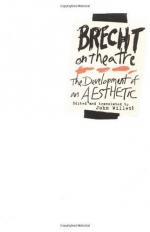
|
| Name: _________________________ | Period: ___________________ |
This quiz consists of 5 multiple choice and 5 short answer questions through 1948-1956 (Berlin), Section 1.
Multiple Choice Questions
1. Who was the interviewer in "Conversations with Bert Brecht"?
(a) Helen Weigel.
(b) Rheinhold Grimm.
(c) Samuel Bernadin.
(d) Bernard Guillemin.
2. Brecht states that when an actor sings, he undergoes a change of _____.
(a) Scene.
(b) Rhythm.
(c) Worth.
(d) Function.
3. Brecht states that radical transformation of theatre can't be the result of some _____.
(a) Artistic whim.
(b) Recommendation.
(c) Second thought.
(d) Intuition.
4. Die Mutter is based on whose novel, Mother?
(a) Penderecki.
(b) Goedel.
(c) Chaplin.
(d) Gorki.
5. Brecht states that "A theatre which makes no contact with the public is _____."
(a) Sacred.
(b) Anonymous.
(c) Perfect.
(d) Nonsense.
Short Answer Questions
1. Life of Galileo starts with a man having his _____.
2. In Piscator's Threepenny Opera, the _____elements were built in.
3. What needs to be alienated in epic theatre depends on the _____ demanded by the entire episode.
4. Lehrstucke are Brecht's _____ works.
5. A masterly use of _____ can be seen in Chinese acting.
|
This section contains 156 words (approx. 1 page at 300 words per page) |

|




